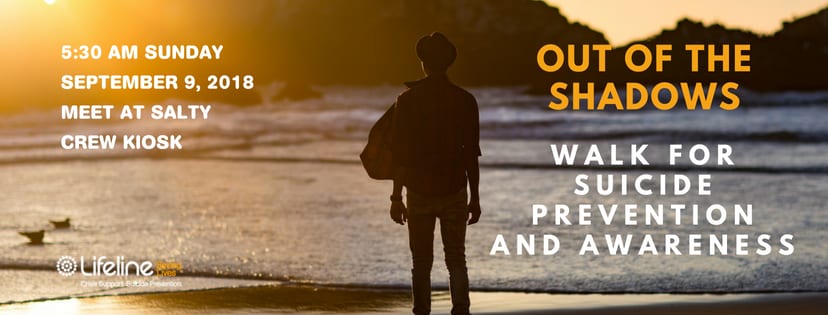Lifeline Mid Coast will be holding their annual bereavement walk ‘Out of the Shadows’ in Port Macquarie on Sunday 9 September 2018.

Out of the Shadows is a journey of remembrance and a walk that unites the community. It provides a time and space to acknowledge the ways in which suicide and mental illness have affected our lives and our loved ones. It’s a time to mourn those people in our lives who have been lost to suicide.
By participating in the Out of the Shadows walk, you are helping to raise awareness, joining Lifeline Mid Coast in a commitment to prevent further deaths by suicide.
The walk coincides with World Suicide Prevention Day. Suicide prevention starts with recognising warning signs and treating them seriously. Talking to a friend or family member about their suicidal thoughts and feelings can be extremely difficult. But if you’re unsure whether someone is suicidal, the best way to find out is to ask. You might be worried that you could ‘put the idea of suicide into the person’s head’ if you ask about suicide. You can’t make a person suicidal by showing your concern. In fact, giving a suicidal person the opportunity to express his or her feelings can give relief from isolation and pent-up negative feelings, and may reduce the risk of a suicide attempt.
The World Health Organisation estimates that over 800,000 people die by suicide each year – that’s one person every 40 seconds. In Australia 2,866 Australians took their own life in 2016 (ABS Data 2016). Research also tells us that some 65,000 people think about attempting suicide each year.
Lifeline’s new Suicide Prevention and Awareness Manager, Kelly Saidey says, “Suicide is an important issue of community concern and we can make a difference. We are committed to preventing suicide and Out of the Shadows is a place where we gather united in our commitment to bringing hope and help to people in a dark place, while we remember those lost to suicide and acknowledge the pain for those left behind.”
“The walk is very poignant,” says Lifeline’s Marketing Coordinator Lisa Willows. “It’s really sad, but really important. Most of us have been affected by suicide. The Out of the Shadows walk provides a safe space for us to all come together and remember our loved ones. You are truly with people who know what you are going through.”
Join Lifeline for the walk on Sunday 9 September 2018. Bring your friends and family along and do the walk together. You can register online or just turn up at 5:30 am at the Salty Crew Kiosk at Town Beach to walk along the foreshore to North Town Beach Reserve, remembering those lost to suicide as the sun comes up.



